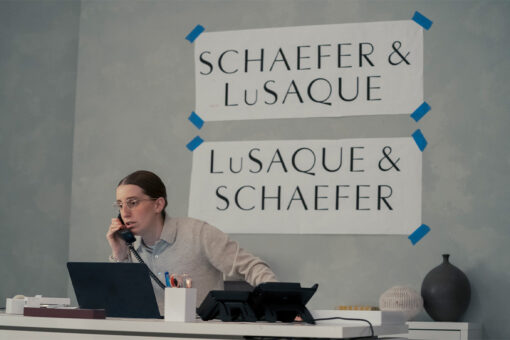The musical “Falsettos” premiered on Broadway in 1992. After touring the U.S. in 1993, it returned to Broadway more than a decade later, in 2016. It made it to the West End in 2019.
And here I am, in 2023, still absolutely obsessed.
This iconic theatrical piece offers some of the best queer and Jewish representation out there — including its portrayal of queer Jewish chosen family that still rings true today.
For those who, unlike me, haven’t recently rewatched the pro-shot of the 2016 Broadway revival, “Falsettos” tells the story of Marvin, husband to Trina and father to Jason. Marvin is struggling with his queer identity, as well as his internalized homophobia. Rarely intimate with his wife, Marvin is in a queer relationship with Whizzer, yet wants to keep up the illusion of a nuclear family. This obsession with maintaining society’s norms shows up even in his relationship with Whizzer, expecting Whizzer to fulfill the role of submissive domestic partner with Marvin as the head of the family.
Meanwhile, Trina visits Mendel, Marvin’s psychiatrist, at Marvin’s suggestion. Mendel falls for Trina, while continuing to treat the family (yikes!). He eventually romances and proposes to Trina (double yikes!). Marvin is jealous and angry that Trina is marrying someone else — especially his psychiatrist. The end of Act 1 concludes with emotions high between the two couples. Whizzer and Marvin break up, and Marvin tries to repair his relationship with his son.
Act 2 fast-forwards two years. Marvin and Whizzer have recently gotten back together, and the two couples struggle to coexist so they can plan and execute Jason’s bar mitzvah. We meet two new characters, “the lesbians from next door”: Dr. Charlotte and Cordelia. It is the beginning of the AIDS epidemic, and Dr. Charlotte does not yet know what mysterious virus is killing her patients. Whizzer suddenly becomes very ill.
The scenes that follow are heartbreaking and meaningful. Dr. Charlotte and Cordelia visit Whizzer and Marvin in the hospital. They sing a song that refers to the four of them collectively as lovers, and they each say “I love you” to each other. This beautiful moment reflects the historical networks of lesbians who cared for gay men during the AIDS crisis, and again that concept of chosen family.
The story’s queerness and Jewishness coincide at the climax: Jason’s bar mitzvah service, which Jason chooses to hold in Whizzer’s hospital room. Mendel calls Jason to the Torah, saying, “Son of Abraham, Isaac and Jacob, Son of Marvin, Son of Trina, Son of Whizzer, Son of Mendel.” Dr. Charlotte and Cordelia add in, “Godchild to the lesbians from next door.” This is a very significant moment because Jason would traditionally be called for his aliyah as only the son of his father. By naming Jason as all of their children, Mendel solidifies the characters’ strong bonds and nontraditional family structure. This is queer Jewish ritual innovation, modifying Jewish tradition in order to affirm a queer family.
After Jason reads from the Torah, Whizzer thanks him, collapses and dies. The musical closes with Marvin singing to the newly-departed Whizzer, naming that he does not regret their relationship, and breaking down surrounded by his loved ones.
When I first saw this musical, I was pleasantly surprised that it does not portray the two identities of queer and Jewish as in conflict with one another. “Falsettos” is very queer, with gay and lesbian relationships and public displays of affection. This musical is also very Jewish — from “Four Jews in a Room Bitching,” where the men sing of their neurosis and shortcomings through Biblical motifs, to the many Jewish references, to a song about how Jewish boys cannot play baseball (and again, that whole bar mitzvah plotline). The musical’s only allusion to the possible tension between queerness and Jewishness is when Trina reflects that she assumed she’d live a straight, middle-class, Jewish life, but then continues on to say that “families aren’t what they were,” demonstrating that she has embraced the changing times.
With today’s rising queerphobia, it is refreshing to see a story centering queer family and joy. While it is true that internalized homophobia and the AIDS crisis make up for central stories of the musical, I find it refreshing how its queer Jewish identities are not the main source of conflict. We accept Marvin’s and Whizzer’s (and Charlotte’s, who in this production is implied to be Jewish) queerness and Jewishness.
Throughout my adulthood, I have been blessed to find queer Jewish community, bonding with queer Jewish friends and mentors to form my own kind of family. I have found home, security and beauty in these nontraditional familial structures. As I recently reflected on Keshet’s blog, “just like the Jewish people, the queer community is one of resiliency, resistance, and joy. We hold each other with care, support, and love. It’s from this place of holding one another that we developed the concept of ‘chosen family:’ defining our family on our own terms based on the relationships most important and sacred to us.” I can think of no better fictional encapsulation of this concept than Jason’s bar mitzvah — a moment of unconditional queer Jewish love.
That’s why this musical is so dear to my heart. And why I insist, if you haven’t yet (or recently), to watch “Falsettos” as soon as you can. You will laugh, you will cry and you will never look at a banana-carrot-surprise the same way again.
Late Take is a series on Hey Alma where we revisit Jewish pop culture of the past for no reason, other than the fact that we can’t stop thinking about it?? If you have a pitch for this column, please e-mail submissions@heyalma.com with “Late Take” in the subject line.




